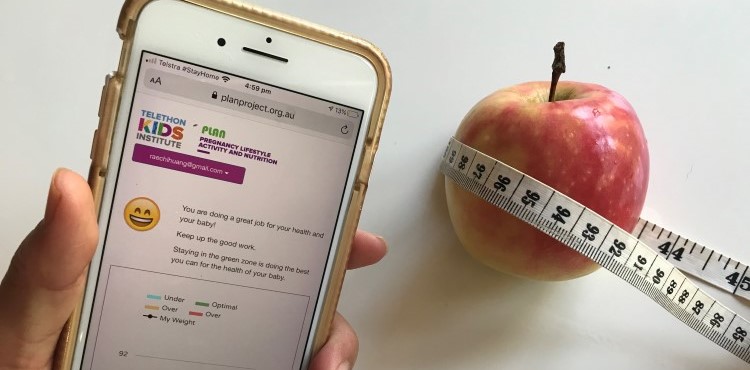
A diet and lifestyle mobile app targeting a critical window in early pregnancy is being introduced to women in the northern suburbs of Perth, hoping to assist with breaking the ‘transmission’ of obesity from one generation to the next.
Obesity – a health issue that costs Australia an estimated $58 billion a year – is projected to affect 75 per cent of the Australian population by 2030, partly thanks to ‘intergenerational transmission’ which sees the health issue passed from one generation to the next.
It’s a cycle researchers with The ORIGINS Project believe they can help to break with a simple, well-timed intervention aimed at prospective mothers early in their pregnancies.
The evidence-based PLAN (Pregnancy, Lifestyle, Activity and Nutrition) app collects data from pregnant women and provides interactive feedback to help them achieve healthy gestational weight gain and maintain diet and exercise during pregnancy.
A clinical trial involving women birthing at the Joondalup Health Campus (JHC) showed that after 12 weeks of using the PLAN app, the intervention group had a significantly improved diet, improved measured motivation to change their lifestyle, and lower infant weight at three months of age, compared to a control group.
The results led JHC – in consultation with its antenatal clinic, dietetics, paediatric and obstetric departments, and the Perth Pregnancy Clinic – to endorse wider roll-out of the PLAN app and it is now being embedded in routine clinical practice in the antenatal clinic.
Clinical researcher Associate Professor Rae-Chi Huang, who led the PLAN study, said that previously there had been no formalised way of addressing overweight and obesity in mothers who came to JHC to have their baby.
“JHC has 3,500 births each year and we found that more than 40 per cent of these mothers enter pregnancy overweight or obese,” Associate Professor Huang said.

JHC antenatal clinic now includes information on the PLAN app as part of its obstetric welcome pack, delivered to all women birthing at the hospital.
“Having the app certainly helps with difficult conversations around weight gain in pregnancy that may assist women getting intervention and support at an appropriate time in pregnancy,” JHC antenatal clinic midwife Nicole Shaw said.
Associate Professor Huang believes the PLAN app will help many women maintain a focus on good health during their pregnancy journey.
“We are seeing an increasing number of studies promoting healthy gestational weight gain, but a limitation of many of these interventions is the reliance on support from research staff or health professionals, restricting the reach and scalability to larger sections of the community,” she said.
“With the JHC antenatal clinic offering the digital delivery of these interventions through the PLAN app, it offers a low-cost, easy access method to augment their health professional care.”
The Western Australian Health Translation Network awarded Federal Budget funds for the Rapid Applied Research Translation program to conduct this work in the antenatal area of Joondalup Health Campus.

